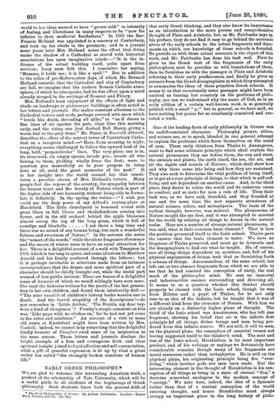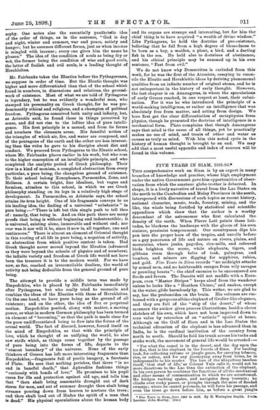EARLY GREEK PHILOSOPHY.*
WE are glad to welcome this interesting American work, a product of the scholarship of Yale University, which will be a useful guide to all students of the beginnings of Greek philosophy. Such students know both the general drift of • The FIrat Philosophora of Greece. By Arthur Fairbanks. London : Kogan Paul. Trench. and Co. [7s. Gd.]
that early Greek thinking, and they also know its importance as an introduction to the more precise and comprehensive thought of Plato and Aristotle, but, as Mr. Fairbanks says in his preface, they do not find it easy to go behind the accounts given of the early schools to the actual fragments and docu- ments on which our knowledge of those schools is founded. To provide us with those actual accounts is the object of this work, and Mr. Fairbanks has done his task well. First he gives us the Greek text of the fragments of the early philosophers, next he provides us with translations of these, then he furnishes us with the passages in Plato and Aristotle referring to their early predecessors, and finally he gives us extracts from the Greek doxographists in which they attempted to summarise the ideas of these primitive Greek schools. It seems to us that occasionally some passages might have been omitted as bearing but remotely on the problems of philo. sophy, nor can we understand why the name of God, as in an early edition of a certain well-known work, is so generally printed with a small "g;" but in general, as we have said, we have nothing but praise for so excellently conceived and exe- cuted a work.
One of the leading facts of early philosophy in Greece was its undifferentiated character. Philosophy proper, ethics, and science are, so to speak, blended in one general attempt to explain the problems which force themselves on the mind of man. Those early thinkers, from Thales to Anaxagoras, want to find some ultimate principle which shall explain the natural phenomena they see before them, the sun and stars, the animals and plants, the earth itself, the sea, the air, and all the sights and sounds of Nature ; which shall show how and why these came into being and how they are sustained. They also seek to determine the vital problem of being itself, or to get at a root principle of things, to that which is self-suf- ficing and not dependent on another cause. And, in the third place, they desire to relate the world and its unknown cause to conduct, and so make for men a rule of life. Thus their task was, as we have said, threefold, and they founded at one and the same time the now separate structures of natural science, ethics, and metaphysics. The basis of the earliest thought, however, was natural. The phenomena of Nature caught the eye first, and it was attempted to account for the world by relating all things to forces in the natural realm. Here are a number of strange natural phenomena, it was said, what is their common basic element ? That is how the problem presented itself to the Ionic school. Thales gave the answer that the basic element is water. We have no fragment of Thales preserved, and must go to Aristotle and the doxographists to find out what he taught. He, of course, saw all living things dependent on moisture, and, full of his physical explanation of things, took that as furnishing forth a scheme of things. Anaximandros, of the same school, has left one or two obscure fragments from which we are able to see that he had reached the conception of unity, the real mark of the philosophic mind. He sees an immortal and indestructible essence surrounding and directing all. It seems to us a question whether this thinker should properly be classed with the Ionic school, though he was from Miletos and a pupil of Thales, for he not only rose to an idea of the Infinite, but he taught that it was of a different kind from the elements of Nature. With him we are already on a distinctly higher plane of thought. The third of the Ionic school was Anaximenes, who has left one fragment, showing his belief that air is the infinite first principle !of all things, divine beings and men being pro- duced from this infinite source. We are still, it will be seen, on the physical plane, the conception of essential reason not having suggested itself to the thinker's mind. The next and last of the Ionic school, Herakleitus, is its most important product, and of his writings or sayings we fortunately have considerable remains, though many of his fragments are moral sentences rather than metaphysics. He is still on the physical plane, his originating principle being fire "ever. living," which !neither gods nor men have made. But the interesting element in the thought of Herakleitus is his con- ception of all things as being in a state of eternal "flux," a doctrine somewhat analogous to the modern concept of "energy." We note here, indeed, the idea of a dynamic rather than that of a statical conception of the world entering thought, and hence Herakleitus must always occupy an important place in the long history of philo.
sophy. One notes also the essentially pantheistic idea of the order of things, as in the sentence, " God is day and night, winter and summer, war and peace, satiety and hunger; but he assumes different forms, just as when incense is mingled with incense ; every one gives him the name he pleases." The idea of the condition of souls as being dry or wet, the former being the condition of wise and good souls, the latter of foolish and evil souls, is a leading thought of Herakleitus.
Mr. Fairbanks takes the Erleatics before the Pythagoreans, we suppose in order of time. But the Eleatic thought was higher and more differentiated than that of the school which found in numbers, in dimensions and relations, the ground- work of existence. Most of what we are told of Pythagoras is legendary, but he was evidently a wonderful man, who stamped his personality on Greek thought, for he was pre- dominantly ethical and religions, and a champion of political freedom. Pythagoras conceived both unity and infinity, bat, as Aristotle said, he found these in things perceived by sense, and did not rise to the loftier idea of pure intelli- gence. His first principle is a monad, and from its forms and numbers the elements arose. His fanciful notion of the triangles of which air, fire, and water are composed, and of the pentagons of the earth and the nether are less interest- ing than the rules he gave to his disciples about diet and conduct. We proceed from Pythagoras to the Eleatic school, whom Mr. Fairbanks places earlier in his work, but who rose to the higher conception of an intelligible prinoiple, and who completed the analytic period of Greek philosophy. Their view is a kind of monism, a completed abstraction from every particular, a pure being, the changeless ground of existence. To their school belong Xenophanes, Parmenides, Zeno, and Melissos. A certain bright, fine idealism, but vague and formless, attaches to this school, in which we see Greek philosophy standing on its legs in a relatively high stage of development. In Parmenides, as Aristotle says, the school attains its true height. One of his fragments conveys to us his leading idea, the finding of a universal " substantia " in pure being :—" There is left but this single path to tell thee of : namely, that being is. And on this path there are many proofs that being is without beginning and indestructible; it is universal, existing alone, immovable and without end; nor ever was it nor will it be, since it now is, all together, one and continuous." There is almost an element of Oriental thought in this rooting of all life in pure being, a negation of activity, an abstraction from which positive content is taken. Had Greek thought never moved beyond the Eleatics (advanced as they were beyond the schools of physics and of numbers), the infinite variety and freedom of Greek life would not have been the treasure it is to the modern world. For we have now, so far, reached an irreconcilable dualism, the world of activity not being deducible from the general ground of pure being.
The attempt to provide a middle term was made by Empedokles, who is placed by Mr. Fairbanks immediately alter Pythagoras, but who really tried to reconcile and combine the ideas of the Eleaties with those of Herakleitus. On the one hand, we have pure being as the ground of all existence; and on the other, the idea of flux or perpetual motion. Empedokles posited, along with matter, a moving power, or what in modern German philosophy has been termed an element of "becoming," so that the path is made clear for the pure undifferentiated being to flow into the forms of the actual world. The fact of discord, however, forced itself on the mind of Empedokles, so that with the principle of love, which he thought of as unifying the world, be also saw strife which, as things come together by the passage of pure being into the forms of life, departs to the "utmost boundary" of the universe. None of the early thinkers of Greece has left more interesting fragments than Empedokles,—fragments full of poetic imagery, a foretaste of Plato. He sees that nothing perishes, that there " is no end in baneful death," that Aphrodite fashions things "curiously with bonds of love." He promises to his pupil cures for ills and protection against old age, and tells him that " thou shalt bring seasonable drought out of dark storm for men, and out of summer drought thou shalt bring streams pouring down from heaven to nurture the trees ; and thou shalt lead out of Hades the spirit of a man that is dead." His physical speculations about the human body
and its organs are strange and interesting, but for him the chief thing is to have acquired " a wealth of divine wisdom." Like Pythagoras, he held the doctrine of pre-existence, believing that he fell from a high degree of blessedness to be born as a boy, a maiden, a plant, a bird, and a darting fish in the sea. He held also to doctrines of abstinence, and his ethical principle may be summed up in his own sentence, " Fast from evil."
We do not know why Democritus is excluded from this work, for he was the first of the Atomists, essaying to recon- cile the Eleatic and Herakleitic ideas by deriving phenomenal qualities from an infinite number of original atoms, and he is not unimportant in the history of early thought. However, the last chapter is on Anaxagoras, in whom the speculations of early Greece reached, in one respect at least, their culmi- nation. For it was he who introduced the principle of a world-making intelligence, or rather an intelligence that was absolutely free from matter, and acting from design. We here first get the clear differentiation of metaphysics from physics, though he presented the doctrine of intelligence in a mechanical form. Plato complains that though Anaxagoras says that mind is the cause of all things, yet he practically makes no use of mind, and treats of rather and water as causes as truly as mind. With him this noted cycle in the history of human thought is brought to an end. We may add that a most useful appendix and index of sources will be found in this volume.



















































 Previous page
Previous page